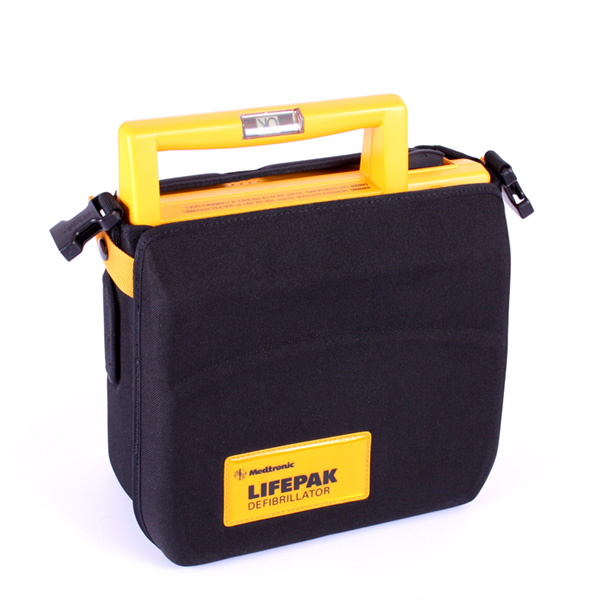Trading-In Old AEDs | When to Upgrade Aging Automated External Defibrillators

Did your organization invest in AEDs (Automated External Defibrillators) a long time ago? If so, bravo for embracing life-safety and for protecting your people (who are obviously your most important assets.) This short article serves as a guide for which AEDs have been discontinued, out of warranty or been deemed “end of life.” Lets the define the differences: discontinued means the devices are no longer manufactured like the Philips HeartStart FR2, out of warranty means the device is beyond its 5 – 8 year warranty and the manufacturer repair and replacement, and “end of life” or “end of support” means the manufacturer no longer supplies the batteries, pads and other accessories. AED One-Stop Shop is your best resource to get honest answers about your old public defibrillators. Perhaps you’ll enjoy our AED Buyer’s Guide online 12 question survey.
Welch Allyn AED 10 & AED 20
Welch Allyn certainly remains in business but they are not active in the North American AED market. Welch Allyn, Inc. was founded in 1915 and is an American manufacturer of medical diagnosis devices, patient monitoring systems, and miniature precision lamps. Headquartered in Skaneateles Falls, New York, Welch Allyn employs more than 2,750 people and has manufacturing, sales, and distribution facilities located throughout the world. Due to the discontinued / unsupported status of the Welch AEDs, these no longer have “trade-in” value towards new AEDs.
Medtronic LIFEPAK 500 AEDs
The LIFEPAK 500 AED hit the market in 1997 and has been utilized by companies, schools, fire departments and communities to protect and save lives. In 2007 the LIFEPAK 500 was discontinued. Beyond the discontinuation of production is an AED’s “end of life” where batteries and electrode pads are no longer available along with repair service. In short this means they need to be replaced. There are two product types: monophasic and biphasic versions. The monophasic version of the LIFEPAK 500 reached its “end of life” in February 2012. The biphasic version of the LIFEPAK 500 reached its “end of life” in January 2015.
Philips HeartStream ForeRunner FR1, FR2, FR2+
Philips Healthcare manufactures the popular HeartStart AEDs that are typically in a distinctive red carrying case. AED One-Stop Shop is an “authorized Philips National Distributor” and we often get questions about AEDs being discontinued and when to replace them. If you’ve had AEDs for about 10 – 20 years it’s possible that your AEDs have reached “End of Life” or at least nearing it. The older type AEDs to be concerned about are: ForeRunner, FR, and FR1. These AEDs are considered obsolete, no longer supported, no longer warrantied and supplies such as batteries and electrode pads are no longer available. From the standpoint of protecting lives, the new AEDs offered by Philips have far better technology, they’re much easier-to-use and they’re more reliable too. From the standpoint of managing risk, organizations with “End of Life” AEDs are wise to replace them immediately. Now to AEDs which are still supported but are nearing their “End of Life.” The AEDs to be aware of are: Philips HeartStart FR2, FR2+, and HeartStream FR2. These AEDs are currently supported by Philips Healthcare and batteries and pads are still available. These devices are expected to reach “End of Life” in December of 2018. The technology is still viable but a short-coming of the FR2 and FR2+ AEDs is that they don’t have pre-connected pads. Having electrode pads which are pre-connected is now a “standard” in the industry. In a chaotic rescue when a loved one or colleague is down and unresponsive, plugging in electrodes is one extra step which can delay the rescue. The FR2 devices still have some “trade-in” value (often between $50 – $100) towards the purchase of a new AEDs.
HeartSine Samaritan 300P
The HeartSine Samaritan AEDs are quite popular because they’re easy-to-use, affordable and manageable to maintain. The lastest HeartSine Samaritan AEDs are the 350P, 360P, and 450P. The older devices which should be replaced right away are the older 300P models.
FirstSave, Survivalink, CardioVive or older Powerheart G3 AEDs
Cardiac Science manufactures the popular Powerheart G3 AEDs (Automated External Defibrillators.) AED One-Stop Shop is a National “Authorized” Cardiac Science dealer and we often get questions about when to replace and upgrade older versions of these devices. Powerheart G3 AEDs are typically blue and yellow in color and they are distinguished by a blue and gray carrying case. If you’ve had Powerheart AEDs for 10 – 20 years you might have AEDs that have been deemed “End of Life” by the manufacturer. To determine if your AEDs are affected by this announcement remove your AED from the carry-case and look at the model number on the back. The model number typically begins with 93XX and the last digits are important: devices which end in -001, -101, and -201 need to be replaced. Devices that end in -501, or -1001 are okay at this time.
Like all technology, the newer AEDs are remarkably better! All the new product features make the rescuer experience simpler and more straight-forward. The new AEDs are far-improved in coaching how to do CPR and can often give real-time feedback. You’ll like newer devices like the Powerheart G5, Defibtech VIEW, HeartSine Samaritan 450P. And rumor has it that brand new devices like the ZOLL AED 3 and the LIFEPAK CR2 with WiFi connectivity may be available soon in the U.S.
AED One-Stop Shop is the best place to get trade-in value for older AEDs and get the latest life-saving technology in your hands. Call us at 855-677-2337 at email us at Sales@AEDOneStopShop.com. Or browse the newest AEDs with pricing on our sister ecommerce site purchaseAEDs.com.



